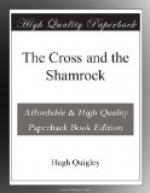Mr. and Mrs. Clarke smiled, and a significant glance passed between them at the gallantry of this speech.
“Why, Paul,” said he, “I think you are a leetle too particular. It would do you no harm to hear our preacher, Mr. Holdforth; I do not see what can be wrong in it, no more than our going to hear the priest.”
“The only difference is,” said Paul, quickly, “that our religion and service being right, and yours being wrong, you can attend our service without scruple, but I could not attend yours without sin. It would be a loss of time, a bad way to spend the Sabbath, or Sunday; the sin of curiosity, or the danger of being an encourager of, or countenancing, a false worship, unauthorized by God or his church.”
“Ah, Paul,” said the editor, “this is taking a high ground, and rather a new one to me; and besides, this is not very logical, for this is what we want to see. This is just the question in dispute between the Roman Catholic church and the Protestant; viz., to which of the two belongs true and lawful worship.”
“You are a lawyer, sir,” said Paul, “and you must know well the evidence is all in favor of the Catholic church—being that founded by Christ, and ruled and guided by the apostles. For, go back to the very apostolic ages, and you will find the rites and the ceremonies of the church, recorded in the writings of the ancient fathers,—as, for instance, in the works of Tertullian, Ireneus, Ignatius,—to be the very same as those now practised in the Catholic church in this country and all over the world.”
“I confess, Paul,” said he, “that the external evidences are rather favorable to Catholicity; but we principally depend on internal evidence, or the feelings of our minds.”
“That,” said Paul, “is no evidence at all; for you have to do with external facts. Institutions, history, monuments, testimony of men, customs, and habits, are the only evidence you can bring to bear on this controversy. How would you like to try a criminal by internal evidence—to tell a jury that you had ‘internal evidence’ of the innocence or guilt of the man accused? How could you discover whether or not Caesar lived by the light of internal evidence? Is it by internal evidence you learn that such cities as Rome, Paris, or Constantinople exist? No, sir; it is by external evidence, which is altogether in favor of our church; and this is more valuable than all the internal evidence that ever existed in the minds of fanatics, from Simon Magus to John Wesley, or from the Gnostics to the spiritual rappers.”
“Husband,” said Mrs. Clarke, “I am afraid of your reputation in this argument about religion.”
“Madam, it is not reputation I seek, but truth; and if I can find it in the Catholic church, I shall embrace it myself, and all my family.”
“You may bid adieu to most of your subscribers, then, after you become a Roman Catholic,” said madam.




